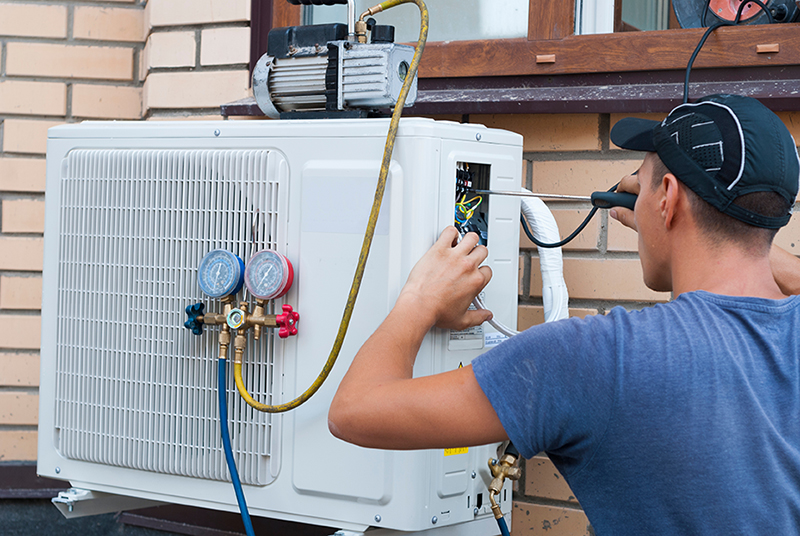Your Guide to Picking the Right HVAC System for Your Needs
Picking a proper Heating and cooling system is a crucial decision that can dramatically affect comfort and power performance in your home. In addition, comprehending the different kinds of systems offered and their power scores can help lead your option.
Recognizing Heating And Cooling System Types
When choosing a heating and cooling system, it is vital to recognize the different kinds offered to meet your certain needs. The key classifications of HVAC systems consist of central air systems, ductless mini-split systems, heatpump, and furnace systems.
Air conditioning systems are developed to cool down multiple spaces using ductwork to disperse conditioned air. They are perfect for bigger homes requiring constant temperature level control. Ductless mini-split systems, on the other hand, supply flexibility and effectiveness, as they permit for zoning abilities, making it possible for individual space temperature level regulation without the requirement for ductwork.
Warm pumps run by moving warmth instead than creating it, making them an energy-efficient alternative for both heating and cooling. Conversely, heater systems utilize combustion to produce heat, utilizing either power, gas, or oil.
Each system has distinctive benefits and factors to consider, consisting of setup demands, upkeep, and general expenses. Understanding these types will aid home owners make educated choices based on their details demands, environment, and budget plan restrictions, eventually guaranteeing optimal convenience and performance.
Examining Energy Efficiency
Energy effectiveness is a crucial variable in the selection of a Cooling and heating system, as it directly influences both utility expenses and environmental sustainability. The Seasonal Energy Performance Ratio (SEER) and the Home Heating Seasonal Performance Element (HSPF) are essential indicators for air conditioning systems, representing their performance over a typical cooling and home heating season, respectively.
Furthermore, look for systems that have gained the power STAR label. This qualification signifies that the devices fulfills strict energy effectiveness standards established by the U.S. Environmental Security Firm. Take into consideration the system's variable-speed technology, which enables extra reliable operation by adjusting the outcome to match need, better enhancing energy savings.
Additionally, correct insulation and air duct securing can significantly affect the system's overall effectiveness. In summary, choosing an energy-efficient cooling and heating system not just decreases your power costs but also adds to a more lasting atmosphere, making it an important consideration in your getting procedure.
Assessing System Dimension
Choosing the proper dimension for a HVAC system is essential to guaranteeing optimal performance and efficiency. A small system might battle to preserve preferred temperatures, resulting in increased damage, greater power usage, and decreased comfort. Alternatively, an extra-large system can cause fast biking, which not just triggers inefficiencies but additionally affects humidity control and air top quality.
To examine the suitable sizing, it is vital to perform a tons computation, which considers variables such as the square video footage of the space, insulation degrees, window sizes, and neighborhood climate conditions - hvac. This estimation aids figure out the British Thermal Units (BTU) needed for heating & cooling. Furthermore, it is vital to make up specific demands, such as the variety of occupants and the existence of heat-generating appliances

Setup Prices and Spending Plan
A comprehensive understanding of installation prices is essential for homeowners and businesses considering a brand-new cooling and heating system. The overall cost of installation can vary extensively based upon a number of elements, including the type of system, the intricacy of setup, and the place of the property. On average, installation prices can vary from $3,000 to $10,000, depending upon the system's size and performance.
When budgeting for a cooling and heating system, it is vital to think about not only the first setup prices however likewise any added costs that might develop, such as ductwork adjustments, electric upgrades, or licenses. Additionally, it is suggested to acquire more numerous quotes from qualified heating and cooling contractors to make certain competitive rates.
House owners need to likewise consider the prospective lasting financial savings associated with energy-efficient systems. While the ahead of time expenses might be higher, energy-efficient designs can lead to considerable savings on utility costs in time.

Upkeep and Durability Factors To Consider

Proper upkeep consists of regular inspections, filter replacements, and cleaning of air ducts and coils (hvac). Overlooking these tasks can result in lowered performance, increased energy costs, and premature system failure. Property owners ought to likewise think about the schedule of solution agreements, which click for source usually give scheduled maintenance and priority service, ensuring that the system remains in peak condition
Longevity differs by system kind; for example, properly maintained central air devices can last 15 to two decades, while warmth pumps might have a life expectancy of 10 to 15 years. Choosing a system with a strong credibility for dependability, along with buying regular upkeep, can dramatically boost the system's toughness. Furthermore, choosing higher-efficiency designs may bring about lasting savings on energy costs, stabilizing the initial investment with time.
Verdict
In verdict, selecting an ideal HVAC system requires mindful consideration of different variables, including system kinds, power efficiency, and size. Eventually, an educated decision will improve convenience and efficiency in domestic atmospheres while maximizing energy cost savings.
Picking an ideal HVAC system is an important choice that can substantially influence comfort and energy efficiency in your home.Energy effectiveness is an important variable in the selection of a HVAC system, as it directly affects both utility expenses and environmental sustainability. The Seasonal Energy Effectiveness Proportion (SEER) and the Home Heating Seasonal Efficiency Factor (HSPF) are vital indicators for air conditioning systems, representing their efficiency over a typical cooling and heating period, specifically. Picking a system with a solid online reputation for integrity, along with spending in normal upkeep, can significantly enhance the system's durability.In conclusion, picking an ideal Cooling and heating system demands cautious consideration of various factors, consisting of system kinds, energy efficiency, and dimension.